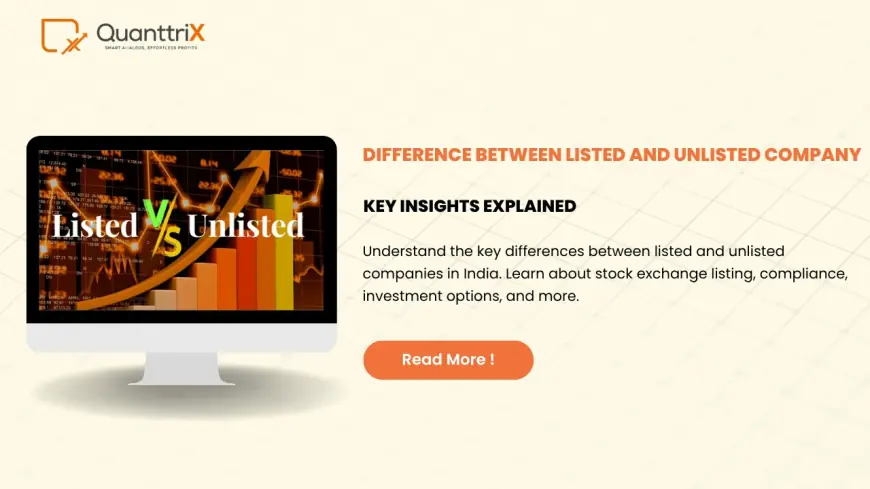Listed vs Unlisted Companies: Key Differences Explained
Explore the difference between listed and unlisted company, Unlisted Shares, and algo trading software price in simple terms for general readers.

Difference Between Listed and Unlisted Company
Introduction
Have you ever wondered what makes a company “listed” or “unlisted”? If you’ve heard these terms in the news or while investing but felt lost, don’t worry—you’re not alone. Understanding the difference between listed and unlisted company is simpler than it sounds. Think of it like the difference between a public concert and a private party. One is open for everyone; the other is exclusive.
Whether you're a casual investor, someone curious about Unlisted Shares, or even interested in how algo trading software price varies depending on the market, this guide will walk you through it all in a friendly, conversational tone. Let’s break it down step-by-step.
Explore the difference between listed and unlisted company, Unlisted Shares, and algo trading software price in simple terms for general readers.
What is a Listed Company?
A listed company is one that is registered on a public stock exchange like NSE, BSE, NYSE, or NASDAQ. These companies sell shares to the general public, and anyone with a trading account can buy or sell them. Being listed often means the company is more transparent and accountable because it must follow strict rules set by regulators.
Example: Think of companies like Tata Motors, Apple, or Reliance—they are all listed and traded openly.
What is an Unlisted Company?
On the other hand, an unlisted company is not available on any public stock exchange. Their shares are privately held, often by a group of investors, family members, or the founders themselves.
Example: Startups like Ola or BYJU’S are unlisted. They’re valued in the private market but not traded publicly.
Key Difference Between Listed and Unlisted Company
Let’s keep this super simple: listed companies are public; unlisted companies are private.
|
Feature |
Listed Company |
Unlisted Company |
|
Public Trading |
Yes |
No |
|
Regulation |
High |
Moderate |
|
Transparency |
High |
Varies |
|
Liquidity |
High |
Low |
|
Investor Access |
Everyone |
Limited |
If listed companies are like malls (open to all), unlisted companies are like boutique stores (invitation only).
Ownership and Shareholding
Listed companies often have thousands—even millions—of shareholders. Ownership is spread wide.
Unlisted companies, in contrast, have concentrated ownership. It could be held by just a few individuals or a venture capital firm.
Why does this matter? Because the more people who own part of a company, the more democratic (and sometimes chaotic) decisions become.
Regulatory Oversight
Listed companies have to report to regulatory bodies like SEBI (India) or the SEC (USA). They’re required to publish quarterly earnings, hold board meetings, and disclose key financials.
Unlisted companies enjoy more privacy. While they are still regulated, the rules are far less strict.
This is a big part of the difference between listed and unlisted company—transparency and red tape.
Public Access and Trading
In listed companies, shares are bought and sold through stock exchanges. Prices change every second based on demand and supply.
With unlisted companies, shares can’t be bought on an app like Zerodha or Robinhood. You need to go through brokers or wait for private placements.
So if you want convenience, listed shares are your best bet.
Valuation and Market Perception
The market decides the value of a listed company every day. That’s why stock prices fluctuate.
But Unlisted Shares? Their value is based on internal assessments, investor rounds, or a company's last funding. It’s not always clear or accurate.
That uncertainty is both a risk and an opportunity.
Disclosure and Transparency Requirements
Listed companies must disclose everything from CEO salaries to environmental impacts. These reports are publicly accessible.
Unlisted companies, however, don’t have to share such details unless they choose to. This means you know a lot more about your investment in a listed company.
Risk and Return Potential
Here’s where it gets interesting.
-
Listed companies are relatively stable, so the risk is lower.
-
Unlisted companies can offer huge returns, but the risk is also higher. Many fail, but a few become the next big thing.
Investing in unlisted companies is like treasure hunting—you might find gold, or nothing at all.
How Unlisted Shares Work
Unlisted Shares are often offered during pre-IPO stages. Investors buy them hoping that one day the company goes public and their investment multiplies.
They are usually held long-term and can’t be quickly sold off.
So think of unlisted shares as planting a tree—it takes time, but the fruit can be worth it.
Buying and Selling Unlisted Shares
You can buy Unlisted Shares through specialized brokers, investment firms, or employee stock options (ESOPs).
Selling them can be trickier. You may need to wait for a buyer or a liquidity event like a merger or IPO.
That’s very different from listed shares, which you can sell anytime the market is open.
Why Some Companies Stay Unlisted
Not every company wants to go public. Here’s why:
-
Avoid regulatory hassles
-
Maintain family or founder control
-
Don’t need extra funds
-
Want to grow quietly
Some businesses believe that privacy and control outweigh the benefits of being listed.
Impact on Algo Trading Software Price
You might be wondering: what does all this have to do with algo trading software price?
Here’s the connection:
-
Algo trading tools thrive in listed markets due to live pricing data.
-
They analyze millions of data points to make lightning-fast trades.
-
These tools are less useful for unlisted shares where prices are not updated in real-time.
So the more active and data-rich the market (like NSE or NYSE), the higher the price of algo trading software—because it delivers more value there.
Choosing Between Listed and Unlisted Investments
Which one should you go for?
-
Listed Companies: Safer, easier, more liquid. Great for beginners or steady investors.
-
Unlisted Companies: Higher potential rewards but riskier. Better for experienced investors with patience and knowledge.
Diversifying into both can also be a smart strategy.
Final Thoughts and Investor Tips
The difference between listed and unlisted company isn’t just about availability—it’s about access, risk, transparency, and potential.
Investor Tip:
Start with listed stocks to learn the ropes. Once you’re confident and have extra funds, explore unlisted opportunities with care.
Remember, every investment—listed or unlisted—is a journey. Walk it wisely.
FAQs
1. Can I invest in unlisted companies as a beginner?
Yes, but it’s recommended to start with listed companies first. Unlisted investments are riskier and less liquid.
2. Are unlisted shares legal in India?
Absolutely. Buying Unlisted Shares through registered brokers or private deals is completely legal.
3. How is the price of algo trading software determined?
It depends on features, speed, data integration, and market depth—higher functionality often means a higher algo trading software price.
4. Can unlisted companies go public later?
Yes, many companies start unlisted and later launch IPOs to become listed.
5. Is it harder to sell unlisted shares than listed ones?
Yes, unlisted shares are harder to sell due to limited buyers and lack of a public market.
What's Your Reaction?
 Like
0
Like
0
 Dislike
0
Dislike
0
 Love
0
Love
0
 Funny
0
Funny
0
 Angry
0
Angry
0
 Sad
0
Sad
0
 Wow
0
Wow
0

















































